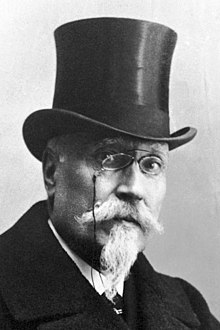José Echegaray
José Echegaray y Eizaguirre (born April 19, 1832 in Madrid ; † September 4 , 12 , 14 or 16 September 1916 there ) was a Spanish playwright , politician and winner of the Nobel Prize for Literature . As a neo-romantic, he made a major contribution to the development of Spanish drama; his pieces were performed all over Europe.
Life
Echegaray was born in Madrid, where he returned after childhood in Murcia to study engineering at the Escuela de Caminos (actually Escuela Técnica Superior de Ingenieros de Caminos, Canales y Puertos ). After graduating in 1853, he worked as an engineer for a few months and then worked as a lecturer at the Escuela de Caminos until 1868 . In 1857 he married Ana Perfecta Estrada, with whom he had a daughter. In 1866 he was accepted into the Academia de Ciencias Físicas, Exactas y Naturales (Academy of Natural Sciences), of which he was president in later years. His interest in economics started when he was at theEscuela de Caminos met the economist Gabriel Rodríguez.
Echegaray was not involved in the revolution of 1868, which made Spain a constitutional monarchy , although he was friends with its central figure, Juan Prim , and was known as a speaker in the Ateneo of Madrid . He participated in parliamentary debates and constituent assemblies as a member of parliament and was appointed Minister of Economic Development and Finance. In this capacity he founded the Bank of Spain and introduced paper money. After his first successes as a playwright ( El libro talonario from 1874), he resigned his offices, but continued to take part in political life. In 1905 he was again Minister of Finance.
In 1904 Echegaray was awarded the Nobel Prize for Literature together with Frédéric Mistral , much to the displeasure of his country's younger writers (see Generation of 98 ), who saw in him a representative of literary traditions that had to be overcome.
plant
Echegaray wrote over 70 dramas in verse and prose. Again and again he changed his literary style, but always remained true to the romantic school of Spain. As one of the last representatives of this direction, he was also influenced by writers from other European countries, such as Henrik Ibsen , Alexandre Dumas and Hermann Sudermann . He often published under the pseudonyms Jorge Hayaseca or Jorge Hayaseca y Eizaguirre . With his literary work he became one of the pioneers for Jacinto Benavente .
Selection of works
- La esposa del vengado (Drama, 1874, German The Avenger's wife , tr: 1883)
- O locura, o santidad (drama, 1877, German madness or holiness , t: 1889)
- En el seno de la muerte (Drama, 1879, German In the lap of death , t: 1882)
- La muerte en los labios (Drama, 1880, German Death on the Lips , t: 1970)
- El gran Galeoto (Drama, 1881 Galeotto , 1901, 1974 under the title The Great Coupler )
- Vida alegre y muerte triste (Drama, 1885 German. Funny life - sad death , t: 1892)
- De mala raze (Drama, 1886 German Adelina (also: von Bad Rasse) , t: 1970)
- Mariana (Drama, 1892 German Mariana Ü: n.d. 1896–1900)
- Mancha que limpia (Drama, 1895 German Mathilde or The spot that cleans , t: 1898)
- Herencias malas (drama, 1902 German Bad inheritance , tr: 1904)
- En el puño de la espada (Drama, 1875)
- En el pilar y en la cruz (Drama, 1878)
- Conflicto entre dos deberes (1882)
- El hijo de Don Juan (Drama, 1892)
Web links
- Literature by and about José Echegaray in the catalog of the Ibero-American Institute in Berlin
- Literature by and about José Echegaray in the catalog of the German National Library
- Newspaper article about José Echegaray in the 20th century press kit of the ZBW - Leibniz Information Center for Economics .
- Literature by and about José Echegaray in the catalog of the library of the Instituto Cervantes in Germany
- Information from the Nobel Foundation on the awarding of the 1904 prize to José Echegaray (English)
- Works by and about José Echegaray at Open Library
- Works by José Echegaray in the Gutenberg-DE project
| personal data | |
|---|---|
| SURNAME | Echegaray, José |
| ALTERNATIVE NAMES | Echegaray y Eizaguirre, José |
| BRIEF DESCRIPTION | Spanish writer, politician |
| DATE OF BIRTH | April 19, 1832 |
| PLACE OF BIRTH | Madrid |
| DATE OF DEATH | September 4, 1916 or September 12, 1916 or September 14, 1916 or September 16, 1916 |
| Place of death | Madrid |
